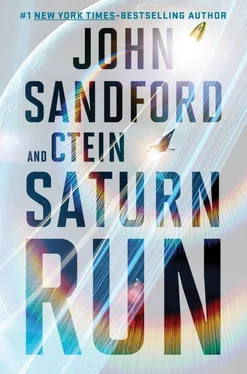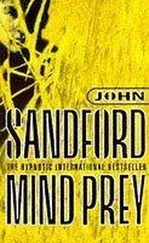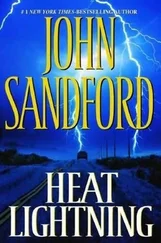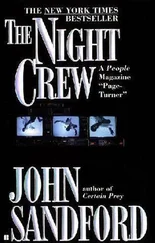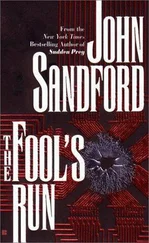John Sandford and Ctein
SATURN RUN
CTEIN DEDICATES THIS NOVEL TO PAULA BUTLER
SANDFORD DEDICATES IT TO BEN, DAN, AND GABRIEL CURTIS, HIS GRANDSONS
FEBRUARY 9, 2066
From ten kilometers out, the Sky Survey Observatory looked like an oversized beer can. Yellow-white sunlight glittered from the can’s outward side, while the other half was a shifting fun house reflection of the pale blues and pearly cloud streaks of the earth, a thousand kilometers below.
The can was not quite alone: an egg-shaped service module, human-sized, encrusted with insectile appendages, ports, windows, and cameras, was closing in on it. Storage lockers and canisters surrounded the base of the egg. Had there been any air around it, and anything with ears, the faint twang of country music might have been heard vibrating through its ice-white walls: “Oh, my ATV is a hustlin’ on down the line, and them tofu critters are looking mighty fine….”
The handyman was making a house call.
The Sky Survey Observatory carried four telescopes: the Big Eye, the Medium Eye, the Small Eye, and Chuck’s Eye, the latter unofficially named after a congressman who slipped the funding into a veto-proof Social Security bill. The scopes stared outward, assisted by particle and radiation detectors, looking for interesting stuff.
All of the SSO’s remotely operable telescopes, radio dishes, and particle sensors, all the digital cameras and computers, all the storage systems and fuel tanks and solar cells, lived at the command of astronomers sitting comfortably in climate-controlled offices back on the ground.
Until the observatory broke. Then somebody had to go there with the metaphorical equivalent of a screwdriver.
One of the groundhuggers called, “Can you see it?”
Joe Martinez said into his chin mike, “Yeah, I can. Holy cow. Something really whacked that motherfucker.”
“What! What? Joe, what—”
“Just messin’ with you, Bob.”
“Hey, Joe? I’m pushing the button that cuts off your air.”
“Didn’t know you had one of those.”
“You don’t mess with astronomers, Joe. Cutting the air in three-two-one…”
____
Martinez was a handyman; his official title was chief of station operations, which meant that he kept the place running.
He hadn’t had much to do except drink coffee and read the current Guitar Riffs for the last couple of hours, waiting to make the approach to the SSO. Barring some weird million-to-one mishap, his trajectory was fixed by the laws of physics and the impulse from the low-velocity rail-gun at the station; the computer said he was exactly on track. He sucked down some more of the decaf, his fingers unconsciously tapping out a counterpoint to the Blue Ridge Bitches, the band he currently favored.
Martinez wasn’t a scientist. He did mechanics and electronics, a little welding, a lot of gluing, the occasional piece of plumbing, and still more gluing. He had a degree in electromechanical engineering, but there were days when he thought he should’ve gotten one in adhesives. His engineering and academic background, combined with an instinctive love of machine tools, made him a quick study, but he didn’t have much interest in building new machines.
On the ground, he messed around with electric guitars, video games, propeller-driven airplanes and wooden speedboats. He loved real hardware even more than he loved his computer, and he did love his computer. If he could build it, fix it, refurbish it, or just plain tinker with it, he was happy.
But he was happiest up in the sky, where he did a little of everything; he was the world’s best-paid handyman.
Bob Anderson came back: “What do you think?”
“I can’t see anything,” Martinez said. “I mean, nothing unusual.”
“Good. You going manual?”
“As manual as I can, anyway. And that would be… now.”
He flipped the arming switch on the thruster joystick. Checking the intercept lidar—less than five meters a second of residual velocity, very good—he played the cradle’s thrusters. Practice born of hundreds of runs made his actions nearly unconscious, like riding a bicycle. His eyes took in the instrument readings while his fingers responded with bursts of thrust. It was safer, he’d told Amelia, his third ex-wife, than driving to work.
“What happens,” she’d asked, “if everything fails? I mean, if everything fails down here, when you’re driving to work, you go in a ditch. What if everything fails out there?”
Well, then, he’d said, he’d get a free tour of the universe and would still be on tour when the sun finally died, a few billion years from now. She hadn’t laughed. Then or later.
Martinez had. As the shrinks had noted, isolation didn’t worry him.
“Radar says you’re there,” said Anderson.
“Close. Just a bit further.”
____
The egg’s attitude matched that of the SSO—there wasn’t any particular “upright” in space, but there had been when the can was put together on Earth, and the lettering on the side of it appeared in the proper orientation to Martinez’s eyes. There’d been few visitors to read the lettering—in the eleven years that the observatory had been functioning, there’d been thirty visits, by fewer than a half-dozen different people, one egg at a time.
Of those thirty visits, Martinez had made eighteen. Most of the instruments and scopes were modular, boosted up into space as self-contained operational units, ready for deployment.
Some assembly was required. The instruments had to be fitted into the can, periodically serviced, and upgraded as new and better cameras, computers, and memories were invented. The SSO was the finest piece of astronomical machinery ever produced, and Americans—or the astronomical fraction of them—were committed to making sure it was equipped with the best the taxpayers could afford.
On this trip, Chuck’s Eye was getting an eye exam along with a new camera: Chuck had developed a tic. The vibration could have come from one of the servos inside the camera housing. It could have come from a wire that had worked free from its housing because of the heat-cold cycles. It could have come from any number of things, but whatever the cause, it had to be stopped. The cost of stopping it could vary from nothing at all, to a million bucks or so. The people on the ground were praying for “nothing at all,” since Congress was in one of its semi-decadal spasms of cost-cutting.
Martinez’s right hand played on the sensor panel, bringing up his work tools and assists. At the index finger’s command, power flowed to the servos on the manipulator arms and energized the tactile gloves. The thumb flipped a switch and dozens of tiny directional spotlights flicked on all over the exterior of the egg, banishing the darkness between the egg and the can—in space, flashlights were almost as vital as oxygen.
His right little finger swiveled the lights, bringing them to bear. Years of misspent youth at game consoles had given him reflexes and manual dexterity that a jazz saxophonist might have envied. As his right hand continued to play the instruments, his left worked the joystick, bringing the egg in close and slow. He circled the can one time, making a vid, then eased the egg to a stop relative to the observatory.
Slowly, slowly, a mere millimeter a second, that was the trick. There wasn’t any danger to the observatory; the SSO’s own navigation computers could easily compensate for a bump, firing the observatory’s thrusters and running its orientation gyros to bring it back on point. But why waste the can’s limited fuel supply on a sloppy docking?
Читать дальше
